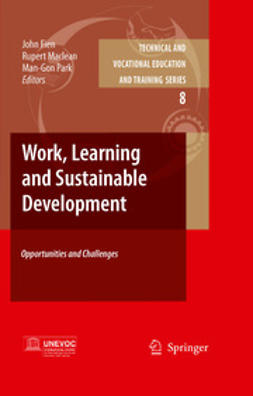Maclean, Rupert
International Handbook of Education for the Changing World of Work
Part I. Overview
1. The Pedagogical Roots of Technical Learning and Thinking
Ron Hansen
2. A Conceptual Framework for Technical and Vocational Education and Training
Jay W. Rojewski
3. Towards Achieving TVET for All: The Role of the UNESCO-UNEVOC International Centre for Technical and Vocational Education and Training
Astrid Hollander, Naing Yee Mar
4. TVET Glossary: Some Key Terms
Jeanne MacKenzie, Rose-Anne Polvere
Part II. The Changing Context of Work and Education
5. Overview: Changing Economic Environment and Workplace Requirements: Implications for Re-Engineering TVET for Prosperity
France Boutin, Chris Chinien, Lars Moratis, Peter Baalen
6. The Right to a New Utopia: Adult Learning and the Changing World of Work in an Era of Global Capitalism
Budd L. Hall
7. Decent Work for All: From ILO Initiative to a Global Goal
Peter Poschen
8. Redefining Gender Roles in the Workforce
Karen F. Zuga
9. Anticipation of Skill Requirements: European Activities and Approaches
Manfred Tessaring
10. Redefining the Status of Occupations
Walter R. Heinz
11. Changing Work, Work Practice: The Consequences for Vocational Education
Stephen Billett
12. Traditional and Transitional TVET Systems
Poonam Agrawal
13. Partnering to Meet the Needs of a Changing Workplace
LuAnn Hiniker, Robert A. Putnam
14. Bridging the Learning Divide: A Study into Adult Learning and Peer Mediation in the Workplace
David Johnson
15. Overview: Education and Training in the Informal Sector
Madhu Singh
16. Tinkering with the Tinker: Meeting Training Needs in the Informal Sector of Chad
Joshua A. Muskin
17. The Traditional Informal Apprenticeship System of West Africa as Preparation for Work
William Ahadzie
18. Initiatives to Link TVET to Self-Employment in Ghana
Robert Palmer
19. Criteria for Training Policy in the Informal Sector: Demands and Challenges in Latin America
Enrique Pieck
20. Informal Learning at Work: The Case of Working Children in Egypt
Laila Iskandar
21. Informal Learning and Work: From Genealogy and Definitions to Contemporary Methods and Findings
Peter H. Sawchuk
22. New Learning Spaces in TVET: The Contribution of Social Partnerships
Terri Seddon, Kathleen Fennessy, Kathleen Ferguson
23. Social and Cultural Aspects of Informal Sector Learning: Meeting the Goals of EFA
Madhu Singh
Part III. Education for the World of Work: National and Regional Perspectives
24. Overview: Changing National VET Systems through Reforms
David Atchoarena, Peter Grootings
25. Latin America’s Efforts in the Vocational Training of Young People from Poor Backgrounds
Claudia Jacinto
26. Accountability and Career Technical Education (CTE) Policy: A Brief Review of Six States of the United States
Joshua D. Hawley, Alexandra Montrichard
27. The Regional Perspective of Vocational Education and Training
Mike Coles, Tom Leney
28. Vocational Education, Training Reform and Regional Integration in the Middle East
Munther Wassef Masri
29. The Influence of Qualifications Frameworks on the Infrastructure of VET
Mike Coles, Patrick Werquin
30. Reforming Skills Development, Transforming the Nation: South African Vocational Education and Training Reforms, 1994–2005
Simon McGrath
31. Reform of Vocational Education in the Russian Federation
Olga Oleynikova, Anna Muravyeva
32. Vocational Education in the Netherlands: In Search of a New Identity
Jan Geurts, Frans Meijers
33. Facilitating Policy-Learning: Active Learning and the Reform of Education Systems in Transition Countries
Peter Grootings
34. Overview: Regional Reviews of TVET
Joshua D. Hawley
35. To Vocationalize or Not to Vocationalize? Perspectives on Current Trends and Issues on TVET in Africa
Moses O. Oketch
36. TVET in the Asian Region: Issues, Concerns and Prospects
P.P.G. Lionel Siriwardene, Muhammad Ashraf Qureshi
37. Transforming TVET Systems with the CPSC in the Asia and Pacific Region
Man-Gon Park
38. European Action Programmes for Lifelong Learning
Johanna Lasonen
39. VET in the Baltic States: Analysis of Commonalities and Differences of Reforms in Estonia, Latvia and Lithuania
Frank Bünning, Berit Graubner
40. Education and Training Needs of Rural Communities: A Situational Analysis of Selected Villages in Fourteen Provinces of Fiji
Paula Cavu, Isimeli W. Tagicakiverata, Seveci Naisilisili, Viliame Rabici
41. Social Partnership in Vocational Education and Training in Lithuania: Challenges and Perspectives
Lina Kaminskienė
42. Integrating Education and Work: The Status of Vocational Education in Brazil
Lucília Regina Machado, Carlos Roberto Jamil Cury
43. China’s Higher Technical and Vocational Education: Development and Reform
Jing Mi, Aihua Wu
44. The Adoption and Adaptation of the Work-Team Concept in Urban Thai Workplaces
Chitrlada Burapharat
45. Globalization of the Labour Culture in the Republic of Korea: What ‘Tripartite Relations’ Mean for Workers
Phoebe Moore
46. Involvement of Labour-Market Partners in TVET in the Russian Federation
Olga Oleynikova
47. Strengthening TVET to Achieve Lifelong Learning for All: Historical Snapshots and Recent Initiatives in Myanmar
Naing Yee Mar
48. Technical and Vocational Education and Training and Rural Development
Lavinia Gasperini
49. An International TVET Programme Development by the International Baccalaureate Organization
Monique Conn
50. A Profile of TVET in the Asia and Pacific Region: A Survey of Progress, Innovations and Promising Practices
Chris Chinien, Elspeth McOmish, Mohan Perera, Alex Chinien
51. Overview: Vocational Education, Social Participation and Livelihoods in Post-Conflict Countries
David Johnson, Lyle Kane
52. From Assessment to Planning: Hope for TVET in Uganda
Bilal Barakat, Lyle Kane, Alex Inglis
53. Linking TVET to Economic Opportunities in Post-Conflict Liberia
Lyle Kane
54. Deepening the Divide: The Differential Impact of Protracted Conflict on TVET Versus Academic Education in Palestine
Bilal Barakat
55. Co-ordinated Programming for Skills Development and Livelihoods in Post-Conflict Societies: What Promise Does TVET Hold for Southern Sudan?
Zuki Karpinska
56. Vocational Training in Post-War Sierra Leone and Liberia
Andrew Benson Greene
57. TVET and Community Re-Integration: Exploring the Connections in Sierra Leone’s DDR Process
Julia Paulson
58. TVET, Women and Conflict: Palestinians in the Lebanese Civil War
Rachel Yarrow
Part IV. The Management of TVET Systems
59. Overview: Navigating the Policy Landscape: Education, Training and Work
Dennis R. Herschbach
60. Research for TVET Policy Development
Jon Lauglo
61. The Reform and Governance of Public TVET Institutions: Comparative Experiences
Keith Holmes
62. National Versus Regional Policy Dimensions of TVET
Peter Noonan
63. Planning for Education and Work: Alternatives and Issues
Dennis R. Herschbach
64. South African Technikons and Policy Contestation over Academic Drift
Andre Kraak
65. New Policy Actions and Government Roles: China’s Reconstruction of TVET Systems Since the 1980s
Deyu Sun, Jingwen Lu, Jun Li
66. Some Generic Issues in TVET Management
George Preddey
67. An Overview of Contemporary TVET Management Practice
George Preddey
68. Overview: Issues and Options in Financing Technical and Vocational Education and Training
David Atchoarena
69. Education, Skills, Sustainability and Growth: Complex Relations
Kenneth King
70. Financing Mechanisms and Instruments: A Conceptual and Operational Approach
Richard Walther
71. Financing Training Through Payroll Levies
Adrian Ziderman
72. Financing Vocational Education and Training in South Africa
Martin Gustafsson, Pundy Pillay
73. Voucher-Financed Training for Small Businesses
Félix Mitnik
74. Employers’ Participation in Training Finance: An Example from Brazil
Candido Alberto Gomes
75. Funding Lifelong Learning from a Life-Course Perspective
Barry J. Hake
76. Economic Perspectives on Technical and Vocational Education and Training in Australia
Gerald Burke, Christopher Selby Smith
Part V. Teacher Education for Vocational Education and Training
77. Overview: The Technical and Vocational Education and Training Profession
Stephen Billett
78. Professionalization of VET Teachers and Lecturers and Practices in TVET Institutions in an International Perspective
Philip Grollmann
79. Teachers, Instructors and Trainers: An Australian Focus
Erica Smith
80. TVET Teacher-Training Requirements in the Russian Federation
Vasiliy P. Kosyrev, Petr F. Kubrushko, Andrei N. Kouznetsov
81. TVET Teachers and Their Professionalization in China: A Problem Analysis
Zhiqun Zhao, Lianwei Lu
82. The Development of Training Modules for Instructors
Fred Beven
83. Literacy and Learning: Are TVET Professionals Facilitators of Learning or Deliverers of Knowledge and Skills?
Jean Searle
84. Vocational Education in the Private Sector in Brazil
Elenice Monteiro Leite, Marinilzes Moradillo Mello, Nacim Walter Chieco
85. TVET and Teacher-Training Curricula: A Developed National Perspective
Vasiliy P. Kosyrev, Petr F. Kubrushko, Andrei N. Kouznetsov
86. Vocational Qualifications: The Role of Trade Unions as Negotiation Fora
Antônio Almerico Biondi Lima, Fernando Augusto Moreira Lopes
87. Vocational Education and Development
Gaudêncio Frigotto, Maria Ciavatta, Marise N. Ramos
88. A Technical and Vocational Teacher-Training Curriculum
Bonaventure W. Kerre
89. Transforming Teachers’ Practice Through Action Learning
Stephen Billett
90. Professional Learning and TVET: Challenges and Perspectives for Teachers and Instructors
Christian Harteis
91. Industrial Attachments for Instructors in TVET Delivery
Sarojni Choy, Sandra Haukka
92. I Hate Left-Handers or Occupational Health and Safety Training
Richard Gagnon
93. The Bologna Declaration and Emerging Models of TVET Teacher Training in Germany
Frank Bünning, Alison Shilela
94. Standards for Occupation-Directed Professional Development of TVET Personnel in Developing Countries
Peter Gerds
95. Curriculum Research and Design as a Subject of TVET Teacher Training: Practice and Experiences from Two International Projects
Joachim Dittrich
Part VI. Education for Work: Research, Curriculum Development and Delivery
96. Overview: TVET Research
Felix Rauner
97. Methods of TVET Research
Felix Rauner
98. TVET Research as an Aid to Improved Policy and Performance in TVET
Christopher Selby Smith
99. Repositioning the Role of Research in the Innovation of TVET
Anneke Westerhuis
100. TVET Research as a Dimension of Innovation
Klaus Ruth
101.
Peter Dehnbostel
102. TVET and R&D Evaluation: The Potential for Optimizing TVET
Ludger Deitmer, Lars Heinemann
103. TVET Research Organizations and Scientific Communities:
Wolfgang Wittig, Uwe Lauterbach, Philip Grollmann
104. Qualifications Research
Felix Rauner
105. Measuring Educational Quality in TVET
Robert D. Renaud
106. Overview: TVET Curriculum Development and Delivery
Felix Rauner
107. The Mutual Shaping of Work, Vocational Competence and Work-Process Knowledge
Nicholas Boreham, Martin Fischer
108. Situated Learning and Cognitive Apprenticeship
Michael Gessler
109. Curriculum Approaches and Participative Curriculum Development
Georg Spöttl
110. The Deskilling and Upskilling Debate
Ulrich Heisig
111. The Pedagogy of Apprenticeship
Uwe Lauterbach
112. Approaches to Designing TVET Curricula
Richard Huisinga
113. Collaborative Work-Related Learning and Technology-Enhanced Learning
Alan Brown, Jenny Bimrose, Sally-Anne Barnes
114. Action-Based TVET
Hans-Dieter Höpfner
115. Vocational Learning: Contributions of Workplaces and Educational Institutions
Stephen Billett
116. Work-Based Learning: An English Experience
James Avis
117. Language Mastery Development within TVET for Professional Mobility
Andrei N. Kouznetsov
118. Why do German Companies Invest in Apprenticeship?
Klaus Schaack
119. Workplace Learning: Metacognitive Strategies for Learning in the Knowledge Economy
Hugh Munby, Nancy L. Hutchinson, Peter Chin
120. Literacy, Design and Technology: New Contexts for Learning and Skills Development in South Africa
David Johnson
121. The Education Gospel and Vocationalism in an International Perspective: The Promises and the Limits of Formal Schooling
W. Norton Grubb, Marvin Lazerson
122. The Vocationalization of Secondary Education: The Relationships between Vocational and Technology Education
Margarita Pavlova
123. Valuing Experience as well as Knowledge in Schools
Ron Hansen
124. Overview: The Growing Role of ICTs in Education and Training
Maja Zarini, David N. Wilson, Naing Yee Mar, Tapio Varis
125. The Pedagogical Framework for On-Line Learning
Shyamal Majumdar
126. A Short Method for Building Web-Based Teaching and Learning Systems: the CPSC Experience
Myong Hee Kim, Man-Gon Park
127. ICT Application in TVET
Boris Kotsik, Natalia Tokareva, France Boutin, Chris Chinien
128. Technology and Leadership in the Fourth Wave of Environmental Changes with Ubiquitous Technology
Man-Gon Park
129. Knowledge Workforce Development for Computer-Supported Collaborative Work Environments
Man-Gon Park, Myong Hee Kim
130. The Role of ICTs and TVET in Rural Development and Poverty Alleviation
Chiranjib Kumar Basu, Shyamal Majumdar
131. Switched on: International Approaches to Skills Development through ICTs
Maja Zarini
132. VOCED: The International Research Database on Vocational Education and Training
Miriam Saunders, Radhika Naidu
133. What are the Limits of ICTs and Media in the Delivery of TVET? An Australian Focus
Peter Kearns
134. Education System Profile: South Africa
Tracey Wallace
135. Integrating TVET with Open and Distance Learning: Taking Skills Training to the Doorstep
Vinay Swarup Mehrotra, Avant Kumar Sacheti
136. Distance Education: The State of the Art in Career and Technical Education
Christopher J. Zirkle
Part VII. Learning for Life and Work: Bridging Academic and Vocational Education
137. Overview: Participation in Formal Programmes of Learning and Skills Development
Natalia Matveeva, Joachim Lapp
138. Access to TVET for All: An Essential Basis for Education for All
Phillip Hughes
139. The Challenges of TVET Global Monitoring
Manuel Cardoso
140. Making Global Classifications of Types and Levels of TVET
Andy Green, Moses O. Oketch, John Preston
141. Trends and Issues in TVET across the Globe
Moses O. Oketch, Andy Green, John Preston
142. Statistical Overview of TVET across Educational Levels
Manuel Cardoso
143. The Ethics of TVET Policy and Practice: Issues of Access and Quality
Richard G. Bagnall
144. Special Needs Education and TVET: The Perspective from the United States
Michael W. Harvey
145. Overview: TVET for Youth
Karen Plane
146. Skills Shortages, Over-Education and Unemployed Youth: An International Dilemma
Kenneth Gray, Sang Hoon Bae
147. New Directions for High-School Career and Technical Education in the United States
Richard L. Lynch
148. Occupations in Demand/Youth Employment
Antoaneta Voikova
149. Pathways and Transitions from School to Work: Australian Experiences
Annette Gough
150. School/Workplace Partnerships: A Case Study of Four Vocational Studies Programmes
Marcelle Hardy, Louise Ménard
151. Vocationalized Secondary Education
Jon Lauglo
152. Vocational Guidance and Career Counselling in the European Union: Origins and Recent Trends
Frederic. J. Company
153. ‘White-Collar’ Work or a ‘Technical’ Career? The Ambitions of Fiji Final-Year School Students
Pam Nilan, Paula Cavu, Isimeli W. Tagicakiverata, Emily Hazelman
154. 14–16 Year Olds Taking Vocational Courses in English Colleges: A Dumping Ground for the Disengaged or a Real Alternative?
Norman Lucas
155. Reconciling the Competing Policy Platforms in TVET? Promulgating ‘the 6Es Plus Education’ for Youth through Social Partnerships
Karen Plane
156. Overview: TVET in an Ageing Society
Tom Karmel, Rupert Maclean
157. Policy Framework on the Retraining for Reskilling of Older Workers through Specialized TVET Programmes1
Theodora Josue, Tesoro Gayondato, Myong Hee Kim
158. Reskilling for All? The Changing Role of TVET in the Ageing Societies of Developing Countriesprotectendnote{First published in Karmel, T.; Maclean, R., eds. 2007.
Margarita Pavlova, Rupert Maclean
159. The Changing Context of TVET for the Workforce in India
Jagmohan Singh Rajput
160. The Reform of the TVET System in the Republic of Korea for an Ageing Society
Hong-Geun Chang
161. Will We Run Out of Young Men? Implications of the Ageing of the Population for the Trades in Australia
Tom Karmel, Koon Ong
162. The Ageing Labour Force and the Retraining of Workers in the Republic of Korea
Jihee Choi
163. Technical Entrepreneurship Development for the Aged
Man-Gon Park, Suresh Kumar Dhameja
164. The Ageing TVET Workforce in Australia: Issues and Challenges^
Hugh Guthrie, Phil Loveder
165. Working and Lifelong Learning among Older Workers (45+) in Japan:
Implications for TVET
Toshio Ohsako
Part VIII. Lifelong Learning for Livelihoods and Citizenship
166. Overview: Adult Education for the Sustainability of Human Kind
Chris Chinien, Madhu Singh
167. The Emergence of ‘Workforce Development’: Definition, Conceptual Boundaries and Implications
Ronald L. Jacobs, Joshua D. Hawley
168. The Challenge for ESD in TVET: Developing Core Sustainable Development Competencies and Collaborative Social Partnerships for Practice
Chris Chinien, France Boutin, Karen Plane
169. Key Competencies: Overall Goals for Competence Development: An International and Interdisciplinary Perspective
Dominique Simone Rychen
170. Education and Training in the Context of Poverty Reduction
Bernd Overwien
171. Recognition, Validation and Accreditation of Non-Formal and Informal Learning and Experience: Results of an International Study
Madhu Singh
172. Self-Directed Learning
Stephen D. Brookfield
173. New Learning Strategies and Learning Cultures in Companies
Peter Dehnbostel
174. PLAR, Training and Efficient Labour Markets: The Canadian Experience
Bill Empey, Christine Newton
175. Transformative Learning Theory and TVET
Karen Magro
176. The Implications of Cognitive Style to Adult Distance Education
Cindy Marie Isaak-Ploegman, Chris Chinien
177. Competency, Meaningful Learning and Learning Styles in TVET
Richard Gagnon
178. Workplace Essential Skills in Policy and Practice: A Canadian Perspective
Erik Vries
179. Adult Numeracy for Work and Life: Curriculum and Teaching Implications of Recent Research
Gail FitzSimons, Diana Coben
180. An Innovative System of Vocational Training in the German IT Sector
Rita Meyer
Part IX. Assessment of Skills and Competencies
181. Overview: Competencies, Qualifications and Recognition
Karina Veal
182. The Certification of Competencies
Danielle Colardyn
183.
Modularization and Modular Delivery of TVET
John Stanwick
184. Diverse Approaches to the Recognition of Competencies
Danielle Colardyn
185. How Do We Measure Up? Benchmarking the WorldSkills Competition
David Hoey
186. Validation of Educational Programmes: Comparing Models and Best Practices1
Grazia Scoppio
187. Regional Accreditation and Certification of TVET Institutions
Ligaya Valmonte, Man-Gon Park
188. National Qualifications Frameworks: An Analytical Overview
Michael F.D. Young
189. Developing a National System of Vocational Qualifications
John Hart
190. National Qualifications Frameworks in Africa
Bonaventure W. Kerre, Astrid Hollander
191. Implementing National Qualifications Frameworks: Problems and Possibilities
Michael F.D. Young
192. Labour Mobility and Mutual Recognition of Skills and Qualifications: The European Union and Australia/New Zealand
Chandra Shah, Michael Long
193. Quality Assurance in TVET in Romania
Magdalena Balica
Keywords: Education, Professional & Vocational Education
- Author(s)
- Maclean, Rupert
- Wilson, David
- Publisher
- Springer
- Publication year
- 2009
- Language
- en
- Edition
- 1
- Page amount
- 3172 pages
- Category
- Upbringing, Education
- Format
- Ebook
- eISBN (PDF)
- 9781402052811











